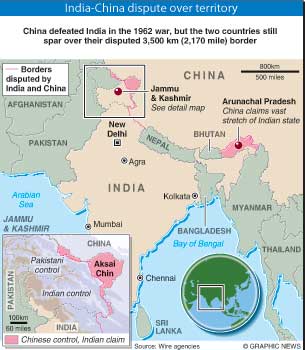NEW DELHI (Reuters) -India summoned China's ambassador on Friday to protest against the refusal of a visa to an Indian general from the disputed Kashmir region, the latest spat between two Asian giants jostling for global influence and resources.
A defence ministry source and some local media said defence ties, so far been limited to visits by military officials and the occasional exercises, were suspended, but the Indian government did not confirm this. Defence Minister A.K. Antony said "ties with China will continue".
 |
| Lt. Gen. Baswal |
Last year, India protested against a Chinese embassy policy of issuing different visas to residents of Indian Kashmir. New Delhi bristles at any hint that Kashmir, where a separatist insurgency has raged for two decades, is not part of India.
"While we value our exchanges with China, there must be sensitivity to each others' concerns," an Indian foreign ministry spokesman said in a statement.
Underlining fresh tensions, India summoned Chinese ambassador Zhang Yan to complain about the denial of visa to the army general, Lt General B S Jaswal, General Officer Commanding-in-Chief of Northern Area Command, according to senior foreign ministry officials.
Despite decades of mistrust, China is now India's biggest trade partner and the current spat, one of several over the last few years, is unlikely to snowball. The value of bilateral deals was expected to pass $60 billion this year, a 30-fold increase since 2000, raising the stakes in maintaining peace.
Distrust between the two economic powerhouses dates back to a 1962 border war, partly over the northeastern Indian state of Arunachal Pradesh that China claims in full.
China's support for India's arch-enemy Pakistan, which backs the Kashmir separatists and also claims the region in full, has not helped defuse tensions.
India is also unhappy with China's economic and political ties with Pakistan and says Chinese involvement in Pakistan-held Kashmir is intended to undermine it.
China defeated India in the 1962 war, but they still spar over their disputed 3,500 km (2,170 mile) border and the presence of exiled Tibetan spiritual leader, the Dalai Lama, in India.
Last year, the Indian media reported on Chinese incursions along the border, incidents the India government shrugged off.
But tension has simmered, particularly over Chinese development projects in Pakistan-controlled Kashmir.
New Delhi is also angry at talks to encourage Chinese university research on Indian Kashmir after a meeting between a Kashmiri separatist leader and Chinese officials this year.
Every time a Chinese action has irritated India this year, New Delhi has responded by upping its engagement with the Dalai Lama, including a meeting between Indian Prime Minister Manmohan Singh and the Tibetan leader this month.
"All this is an indication of bilateral ties heating up because India sees this as interference in its sovereignty," said Srikanth Kondapalli, professor at India's Jawaharlal Nehru University.
India holds 45 percent of the disputed Himalayan region while Pakistan controls a third. China holds the remainder of Kashmir, an icy desert plateau known as Aksai China.
China and Pakistan's close military and political ties are underpinned by long-standing wariness of common neighbour, India, and a desire to hedge against U.S. influence in South Asia.
India and Pakistan, which claim Kashmir in full, have fought two of their three wars over Kashmir since their independence from Britain in 1947.
India has very limited military ties with China, mainly focused on visits by respective military chiefs and government officials and occasional war exercises agreed on in May 2006.
But both Indian and Chinese analysts agree the latest row is unlikely to affect the two country's broader relations.
"Security and military ties are among the weakest aspects of the China-India relationship," Zhang Li, professor of South Asian politics at Sichuan University, told Reuters.
"But because security and military ties are under-developed to begin with this won't have a big impact on the overall relationship."
|



